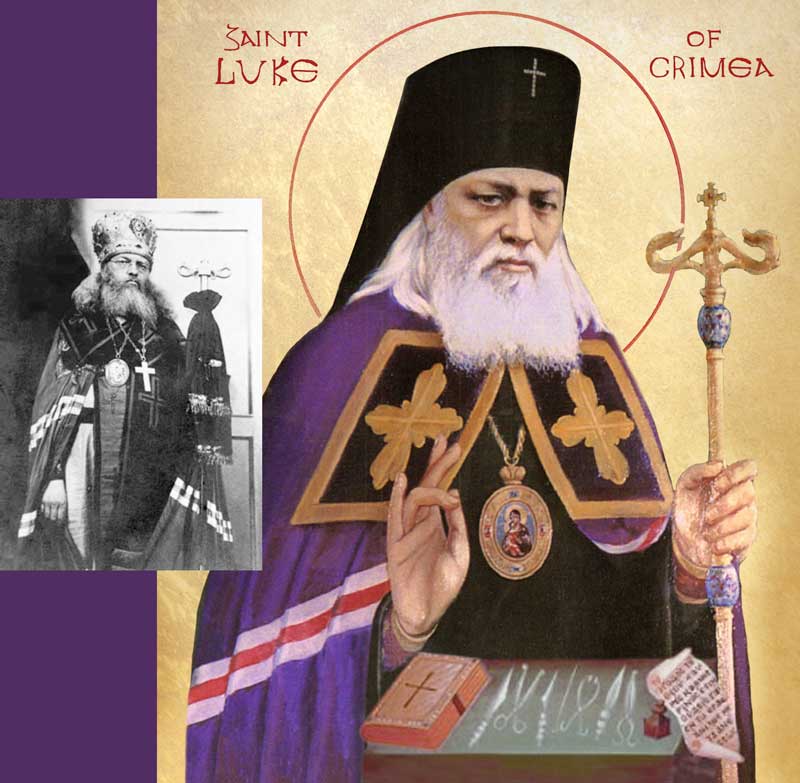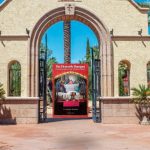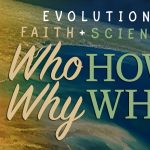
THE HEART: The instrument unknown to science
by Hiero-Confessor St. Luke, Archbishop of Simferopol and Crimea1
“When we look at modern science as it was created by scientists like Lamarck and Darwin, we see the opposition and I would say the absolute discrepancy that exists between science and religion on issues concerning the basic problems of existence and knowledge. For this reason, an enlightened and logical mind can not simultaneously accept both and must choose between religion and science.” –Ernst Haeckel
These words were written 65 years ago by a well-known German zoologist, Darwin's fervent supporter, Haeckel, in his book “The Riddle of the Universe,” which was very successful and, as it seemed, proved that faith is an absurdity. So, Haeckel2 says, every human being with enlightened intellect must choose between science and religion and follow either one or the other. And he considers it necessary that these people should deny religion, because a reasonable person cannot deny science.
Is this really necessary? No, not at all, for we know that many and great scientists were at the same time very faithful people. Such was, for example, the Polish astronomer Copernicus, who laid the foundation for all modern astronomy. Copernicus was not only a believer, but also a clergyman. Another great scientist, Newton, when he spoke the word God was always taking off his hat. He was a very faithful man. A great bacteriologist of our time and almost our contemporary, Pasteur, who laid the foundations of modern bacteriology, began all his scientific work with a warm prayer to God. Ten years ago, a great scientist and compatriot, physiologist Pavlov, who was the creator of the new brain physiology, left this life. He was also a very faithful man. Will Haeckel dare to say that these people do not have an enlightened intellect because they believed in God?
So what happens? So why is it that today as well, there are some university professors, that I know personally, who are people of great faith? Why don’t all scientists deny religion, and only but a part of them have a way of thinking similar to that of Haeckel?
Because these people only believe in matter and deny the spiritual world, they do not believe in the afterlife, they do not accept the immortality of the soul, and, of course, do not accept the resurrection of the dead. They say that science does everything, that there is no secret in nature that science cannot discover. What can we answer to this?
We will answer them as follows: You are absolutely right. We cannot limit the human intellect that explores nature. We know that today science knows only a part of what we ought to know about nature. We also know that the potential of science is great. In this they are right, and we don’t question it. So what do we question? Why don’t we deny religion, as they do, and do not regard it as contrary to scientific knowledge?
Only because with all our heart we believe that there is the spiritual world. We are certain that besides the material world there is a vast and incomparably higher spiritual world. We believe in the existence of spiritual beings that have a mind much loftier than we humans have. We believe, with all our heart, that above this spiritual and physical world there is Great and Almighty God.
What we are questioning is the right of science to explore with its methods the spiritual world. Because the spiritual world is not investigated using the methods we employ to explore the material world. These methods are totally inappropriate for the investigation of spiritual worlds.
Do we know of a spiritual world anywhere? Who told us it exists? If those who ask us are the same people who do not believe in divine revelation, we will answer them, “our heart has told us.” Because there are two ways to get to know something, the first being that about which Haeckel speaks and which science uses to understand the material world. But there is also a different way that science does not know of, and does not want to know, and that is knowledge through the heart. Our heart is not only the central organ of the circulatory system, it is also an instrument by which we know of the other world and acquire the highest knowledge. It is the instrument that enables us to communicate with God and the higher world. We disagree with science only in this.
Considering the great successes and achievements of science, we do not deny its great importance at all, and we do not restrict scientific knowledge. We only say to the scientists, “You do not have the ability to explore the spiritual world with your methods, but we can do it with our heart.”
There are many unexplained phenomena, which are nevertheless true (as is true a natural phenomenon) and concern the spiritual world, and so there are phenomena that science will never be able to explain, because it does not use the appropriate methods.
Let science explain to us how the prophecies appeared about the coming of the Messiah, all of which were realized. Can science tell us how the great Prophet Isaiah, 700 years before the birth of Christ, foretold the most important events of His life, for which reason he was called an evangelist of the Old Testament? Explain to us the insightful grace of the Saints and tell us by what natural methods the Saints have obtained this grace, and how they could, just by seeing an unknown person, immediately understand his heart and read his thoughts? They saw a man for the first time and called him by his name. Without waiting for the visitor to ask, they responded to what was worrying him.
If they can, let them explain it to us. Let them explain how the saints foretold the great historical events which, over time, were realized exactly as they had prophesied. Let them explain to us the visits from the other world and the appearances of the dead to the living.
They will never explain to us why they are far from what is the basis of religion—from faith. If you read the books of those scientists who try to overthrow religion, you will see how superficially they see things. They do not understand the essence of religion, yet they judge it. Their criticism does not touch the essence of the faith, which they cannot understand, but the rituals, that is, the manifestations of the religious sentiment. They do not understand the essence of religion and faith. How is this? Because the Lord Jesus Christ says, “No one can come to me, unless the Father who sent me draws him to me.” (John 6:44)
So the Heavenly Father must draw us; the grace of the Holy Spirit must illumine our heart and mind; through this enlightenment, the Holy Spirit must dwell in our heart and mind; and he who is found worthy to receive this gift acquires the love of Christ by keeping His commandments. Only those who have acquired the Holy Spirit, those in whose heart Christ dwells, together with His Father, know the essence of faith. The others, the outsiders, do not understand it at all.
Let's hear the criticism of a French philosopher, Boutroux,3 against Haeckel. Boutroux says the following:
“Haeckel’s criticism is concerned more about the rituals than the substance, and sees the rituals from a view so materialistic and so narrow that not even people that are religious can accept. Thus, the criticism of religion by Haeckel does not refer to even one of the principles professed by religion.”
This, then, is our view of Haeckel’s book “The Riddle of the Universe,” which to this day is considered a “gospel” for all those who criticize religion, deny it, and find it contrary to science. Do you see that the arguments they use are very poor and without substance? Do not be scandalized when you hear what they say against religion, since those who say it do not understand its essence. You simple people, who have little to do with science, and do not know much about philosophy, always remember the most basic principle, which the early Christians knew very well. They considered unhappy the man who knows all the sciences, but does not know God. On the contrary, they considered blessed the man who knows God, even if he knows absolutely nothing about the earthly things.
Guard this truth as the greatest treasure of your heart. Move forward and look neither to the right or to the left. Let not what we hear against religion make us lose our orientation. Let us keep our faith, which is eternal and indisputable truth. Amen.
Saint Luke, Archbishop of Crimea
“Homilies and Speeches”
Orthodox Kypseli Publications, Thessaloniki
A video on the life of Saint Luke
- Born Valentin Felixovich Voino-Yasenetsky (1877-1961). Practicing medicine even as a hierarch.
- Ernst Haeckel (1834-1919).
- Émile Boutroux (1845-1921). “An eminent 19th century French philosopher of science and religion, and an historian of philosophy. (Wikipedia)




